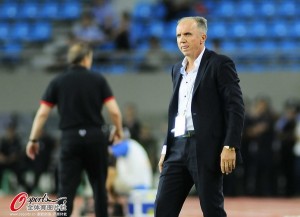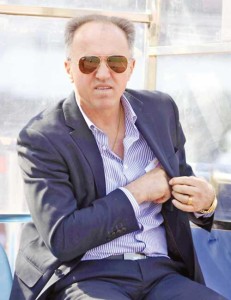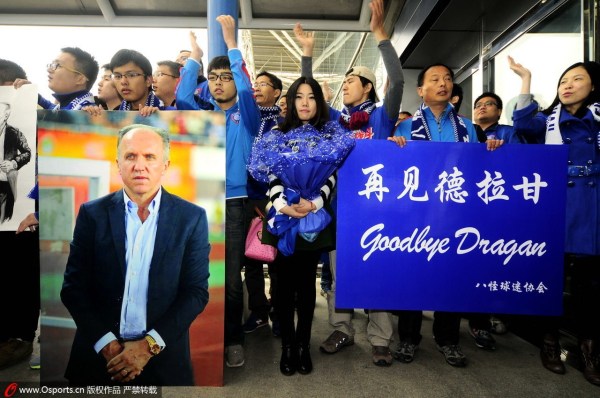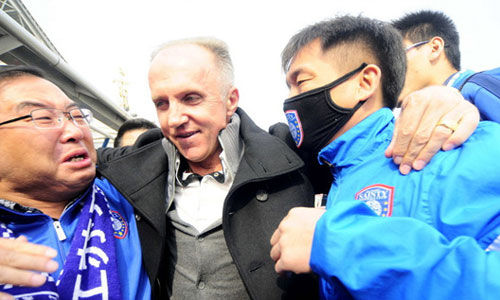Dragan Okuka made waves two seasons ago by leading unfashionable Jiangsu Sainty to runners-up spot in the CSL, pushing powerhouse club Guangzhou Evergrande all the way. The Bosnian Serb head coach is now back in China at another less-fancied club, Changchun Yatai. Wild East Football caught up with Okuka to hear all about his Nanjing adventure and what turn of events led him back to the CSL.
Dragan, you are a vastly experienced and very well-educated coach with a degree in law from Mostar University in Bosnia. Can you tell us a bit about your personal background and how did you become a professional football coach after studying law?
Honestly speaking, if the war in Bosnia didn’t breakout I would never have been a football coach, because I was studying to be a lawyer at the time. After the war started I had to leave Mostar and Bosnia, where I was director of a local football club. After that I went to Becej in Serbia, where I started to work as an administrator for a club (FK Bečej) before later becoming a coach for the first time. Later, I was very successful and we had some amazing results, entering the Inter-toto and UEFA cups. It was these successes which opened me to more possibilities later in my coaching career.
 You returned to China to join Changchun Yatai at the start of this year after a successful two years with Jiangsu Sainty. Can you tell us what attracted you to come back to coach in China again and what aims have Changchun set for the club this year? Does the club simply wish to avoid relegation this year, or does the chairman have a higher goal?
You returned to China to join Changchun Yatai at the start of this year after a successful two years with Jiangsu Sainty. Can you tell us what attracted you to come back to coach in China again and what aims have Changchun set for the club this year? Does the club simply wish to avoid relegation this year, or does the chairman have a higher goal?
Speaking from my own point of view, I didn’t expect that I will so quickly came back to China. After leaving Jiangsu, I had a lot of problems with my hip and right leg, I make a decision to undergo some operations. After recovering, I was visited friends and spent time with my family, and I came back to China to visit friends in Shanghai, Nanjing and Beijing. During that time, Changchun called me. I didn’t accept their offer so quickly, but after watching a few games I saw new challenge for me – the club had after seven games only 6 points, I realised that the club had much more potential than it was showing, so for that reason I accepted the offer. For this season the chairman always has a higher ambition than it possible to achieve, but my ambition is that club will play much better, more offensive, and always play to win, no matter against who are we playing, like the way Jiangsu was playing. We will see how far we can go, but for sure I am optimistic.
Changchun made some interesting signings this year, particularly striker Fatos Bećiraj from Montenegro. How do you rate the other foreign players at Changchun currently? How do you plan to strengthen the squad?
I can say Bećiraj is a great striker and he can do a lot for the club. The other foreign players have to keep a higher standard of performance because they are paid much more then the Chinese players. Speaking about our foreign players at the club, Argentinian Iglisias is an amazing player but unfortunately he’s been out one month due to injury. With Brazilian Enjino I am very satisfied, and also Uzbekistan player Ismailov. Brazilian Rafael has a huge potential to play better and I am sure he will. During the summer break it’s very important to find three or four excellent Chinese players but it is hard to do so.
You gave Changchun‘s number 19, He Chao his first start of his professional career against Shanghai East Asia earlier this season. Is he a player to watch for the future? How do you rate him?
He is a very young prospect, and he will have more opportunities to demonstrate his skills.
Uzbek defender Anzur Ismailov is now in his fourth season with Changchun – how important do you think it is for Chinese clubs to have more continuity and keep foreign players for as long as possible and not constantly introduce new players every year?
Of course good foreign players like Ismailov are a big plus for the club so the longer they stay the better, especially considering foreign players need a long period of adaptation to China.
China has a long history of importing players from the former Yugoslavia, particularly Serbia. Why do you think this is?
Unfortunately in last few years there are not so many good players coming from Serbia, because if they are very good they are often going to West European leagues. I think the mentality of Serbian players is similar to the Chinese and that’s why they have success in China.
 Dejan Damjanovic joined your former club Sainty at the start of this season for a reported 4 million USD transfer fee from Seoul FC in Korea – was this a lot of money for a player who is 33 in a couple of months? It was the biggest transfer between two Asian Clubs – what do you think this means for the future of football in this part of the world?
Dejan Damjanovic joined your former club Sainty at the start of this season for a reported 4 million USD transfer fee from Seoul FC in Korea – was this a lot of money for a player who is 33 in a couple of months? It was the biggest transfer between two Asian Clubs – what do you think this means for the future of football in this part of the world?
The fact that Jiangsu brought the top marksman of Asia from one of the best leagues, Korea, and one of best clubs, Seoul, tells us that Chinese league is becoming more and more dominant and soon could be the best in Asia. It is not question should they bring him or not, the question is can they afford him? A player like him is worth paying for, no matter his age.
Season 2012 was a very successful year for you, being named Serbian coach of the year and CSL coach of the year when Jiangsu Sainty pushed Guangzhou Evergrande all the way for the CSL league title. Looking back, did you believe you could win the league that year? How did it feel at the club, was the feeling in the dressing room one of happiness to have pushed such a powerful club as Evergrande so close, or was it more a feeling of big disappointment that you didn’t win?
The truth is that we were very close to the title and to challenge such a grand club as Evergrande is, a lot of things have to be in the ‘right ‘ place, and you need a bit of luck. I was disappointed after our home game against Evergrande which finished 1:1, this was the important one for the title ( we were 1:0 after 17 seconds) if we won we would be very close to taking the title. On the other hand I was really proud, because 70,000 fans came to give us support. In that game we showed that our small club with a small budget, with no big name or expensive players, could challenge such a big club.
Last season things didn’t go so well at Jiangsu. What were the main factors behind this? Christian Danalanche’s injury and lack of form? What else went wrong, how did you feel about it?
We can not tell that the season was bad, because Jiangsu at the start of season won Super Cup against Guangzhou Evergrande in Guangzhou 2-1. After that we played great in the Asian Champion League, we beat a Japanese side in Japan, and were just one goal away from qualifying for the second round. In the second part of season we paid the price for playing in the Champions league – exhaustion of players, injuries and lack of players for rotation, and a lack of luck no matter how good we played. In the last 10 games we had some tough games, and probably I made some mistakes. But we shouldn’t forgot that in second part of season we had to leave our Olympic Stadium to play in another city (Zhenjiang), which also had a bad physical affect on the players. At one point people thought we might get relegated but I was confident we would not and I was right.

Why did you leave Jiangsu Sainty? Did you part on good terms?
I have to say that I had three amazing seasons in Jiangsu. We achieved amazing and historical results for the club. There were a lot of amazing games, we beat many clubs and broke attendance records. All this contributed to be being voted coach of the year in China and Serbia, which is a great honour and the greatest in my coaching career. What I am most proud of is the fans’ support for me and the club. I remember my first game as a coach of Jiangsu, against Changchun there were only 10,000 fans. Game after game more and more fans game to give us support. And at the end and incredible number – 65,000 fans came for the game against Guangzhou, and for our ACL games. During my last season the average support was 30,000, making third best supported team in the league – this fact is very respectable.
I wanted to stay and to finish what we started three seasons ago. But to my disappointment, the club didn’t offer me new contract and I respected their decision. We parted on good terms. Saying goodbye to the players was very emotional, there were tears, and a send-off from the fans. Their gifts and words to me made me even more proud and assured me that I had done something really great for this club.
During your time coaching in China, have you always had control over which foreign players the club signs? And how much influence do you have over which Chinese players the club signs? Are any changes necessary here, if any?
Whilst I was coach of Jiangsu , of course I had control and trust of people at the club to bring foreign and Chinese players. I can not speak about other clubs because I really don’t know.
You speak English and Polish as well as your native Serbo-Croat. Any plans to add Chinese to this list?
For me it would be great to learn Chinese but for now for me this would be really hard.
What’s the most interesting thing which has happened to you in China in your day-to-day life outside of football?
Everything out of football in China for me is a great experience. Living in such amazing big country with amazing culture, tradition and history for me it is incredible. But the greatest and most beautiful thing I really like in China is the kindness and smiles of ordinary people who I can see every day.
